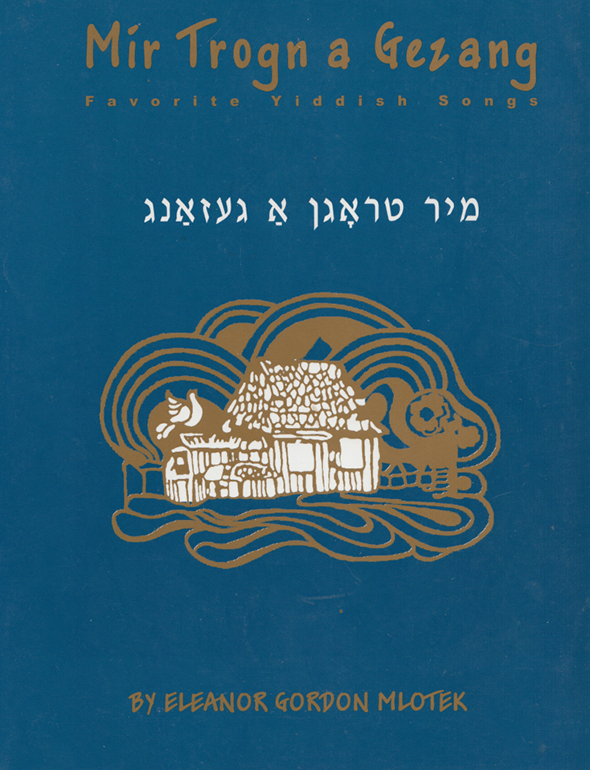Text and music by Mark Markovich Warshawsky (see note to Oyfn Pripetshik on page 2). Originally titled Di Rod (Kales Tsad). The theme was used by Ernest Bloch in the Simchas Torah section of his Baal Shem Suite.

Louder, better!
Make the dance circle wider!
God has made me great,
He has brought me good fortune,
carry on all night, children,
my youngest daughter is married off!
Stronger, more joyful!
You’re the queen and I’m the king!
Wow, wow, I have seen with my own eyes
how God has granted me success —
my youngest daughter is married off!
Itsik! Snap to it!
Why are you silent with that fiddlestick?
Yell at the musicians,
are they playing or sleeping?
Play ’til you bust your strings!
My youngest daughter is married off!
Isaac, you demon!
Grandmother is dancing a kazatske.
Take a look at that (no evil eye),
how she steps and stomps,
Oy! such joy and such delight,
my youngest daughter is married off!
Motl, Shimen!
The poor people have arrived,
set the best table for them
with the finest wine and fish.
Oy, my daughter, give me a kiss!
My youngest daughter is married off!
Hekher! beser!
Di rod, di rod makht greser!
Groys hot mikh got gemakht,
Glik hot er mir gebrakht,
Hulyet, kinder, a gantse nakht!
Di mizinke oysgegebn!
Shtarker! freylekh!
Du di malke, ikh der meylekh!
Oy, oy, ikh aleyn
Hob mit mayne oygn gezen
Vi got hot mikh matsliekh geven —
Di mizinke oysgegebn!
ltsik! shpitsik!
Vos shvaygstu mit dem shmitsik?
Oyf di klezmer tu a geshrey:
Tsi shpiln zey, tsi shlofn zey?
Rayst di strunes ale oyf tsvey! —
Di mizinke oysgegebn!
Ayzik! mazik!
Di bobe geyt a kozik.
Keyn eynhore, zet nor, zet,
Vi zi tupet, vi zi tret,
Oy, a simkhe, oy, a freyd —
Di mizinke oysgegebn!
Motl! Shimen!
Di oreme-layt zaynen gekumen,
Shtelt far zey dem shenstn tish,
Tayere vaynen, tayere fish,
Oy, mayn tokhter, gib mir a kush —
Di mizinke oysgegebn!
העכער! בעסער!
די ראָד, די ראָד מאַכט גרעסער!
גרױס האָט מיך גאָט געמאַכט,
גליק האָט ער מיר געבראַכט,
הוליעט, קינדער, א גאַנצע נאַכט!
די מיזינקע אױסגעגעבן!
שטאַרקער! פֿרײלעך!
דו די מלכּה, איך דער מלך!
אױ, אױ, איך אַלײן
האָב מיט מײַנע אױגן געזען
וױ גאָט האָט מיך מצליח געװען —
די מיזינקע אױסגעגעבן!
איציק, שפּיציק!
װאָס שװײַגסטו מיט דעם שמיציק?
אױף די כּלי–זמר טו אַ געשרײ:
צי שפּילן זײ, צי שלאָפֿן זײ?
רײַסט די סטרונעס אַלע אױיף צװײ! —
די מיזינקע אױסגעגעבן!
אײַזיק! מזיק!
די באָבע גײט אַ קאָזיק.
קײן עין–הרע, זעט נאָר, זעט,
װי זי טופּעט, װי זי טרעט,
אױ, אַ שׂימחה, אױ, אַ פֿרײד —
די מיזינקע אױסגעגעבן!
מאָטל! שמעון!
די אָרעמע–לײַט זײַנען געקומען,
שטעלט פֿאַר זײ דעם שענסטן טיש,
טײַערע װײַנען, טײַערע פֿיש,
אױ, מײַן טאָכטער, גיב מיר אַ קוש —
די מיזינקע אױסגעגעבן!
Song Title: Di Mizinke Oysgegebn

First published in 1972, Mir Trogn A Gezang: Favorite Yiddish Songs was reprinted six more times (in 1977, 1982, 1985, 1987, 1988, 2000) due to popular demand. The songs in this anthology represent a sampling of beloved folk and well-known Yiddish songs, many of which are scattered in various song collections; some appear in very rare and inaccessible collections; and some were never before published. Folk songs comprise about a third of this volume and were selected mainly on the basis of popularity and sometimes for their historic significance. Needless to say, they are only representative of the vast, rich treasure of Yiddish folk material. The selection was made not only on the basis of personal preference, but in the knowledge they are favorites of many who sing these songs. Most of the songs represent the repertoire that was sung at Yiddish summer camps, May 1st demonstrations and at social gatherings. Many songs were introduced to American Jewry by Jewish immigrants who came to the United States after World War II, for whom these songs had been favorites in Poland and other East European communities destroyed by the Nazis.